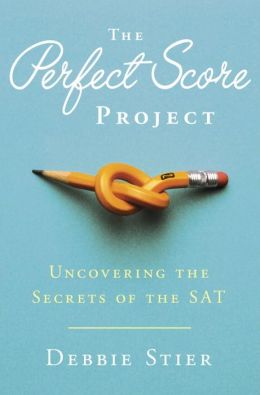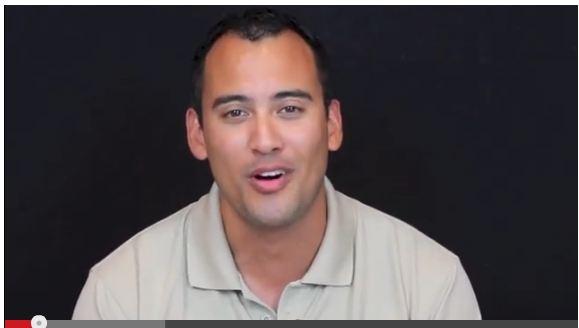 For book industry veteran Debbie Stier--a marketer, publicist, editor and publisher, most recently at HarperStudio and HarperCollins--her book, The Perfect Score Project: Uncovering the Secrets of the SAT, which Harmony Books will publish in February, is not just about her experience taking the SAT seven times in one year or about the vast amount of SAT information she presents that will be helpful for students, their parents and guidance counselors. The book is at heart about "the magic of studying with my son," as she put it.
For book industry veteran Debbie Stier--a marketer, publicist, editor and publisher, most recently at HarperStudio and HarperCollins--her book, The Perfect Score Project: Uncovering the Secrets of the SAT, which Harmony Books will publish in February, is not just about her experience taking the SAT seven times in one year or about the vast amount of SAT information she presents that will be helpful for students, their parents and guidance counselors. The book is at heart about "the magic of studying with my son," as she put it.
The Perfect Score Project began when Stier contemplated her son's college options partway through high school. "He had trouble focusing," she said. "He was into having fun and doing sports. He also had a lot of bad fortune in high school: he had mono and had multiple concussions. He had B grades but no honor classes and not many extracurricular activities. I knew he was smart, and I thought the SAT could make him stand out a bit."
The two had already worked closely together when they both read every book--"thousands of pages, including the Odyssey and Mark Twain," she said--that her son was assigned the summer before he transferred to Fordham Prep, Bronx, N.Y. "At the dinner table at the end of the day discussing the books with him was magic," she said.
In the same way, Stier decided to help her son with the SAT process--but for her, there were no half measures. She took the test seven times that year. (It's offered seven times annually.) With a bit of understatement, she said, "I got a bit possessed." But it was a happy possession.
 Studying for and taking the SAT and trying to improve her scores was fun, she said, "like doing a crossword." Soon she made it fun for her son, too. ("They resist at first, but they do like it.") Her son was also helped by a friendly competition with a friend and did a practice test every weekend in addition to studying with Stier. The result: he raised his score 540 points. Stier noted this with some pride, but then emphasized the magic of the effort. "My son and I talked about politics and literature, and I learned so much reading his essays," she said. Moreover, "he reached his potential and grew into a driven young man."
Studying for and taking the SAT and trying to improve her scores was fun, she said, "like doing a crossword." Soon she made it fun for her son, too. ("They resist at first, but they do like it.") Her son was also helped by a friendly competition with a friend and did a practice test every weekend in addition to studying with Stier. The result: he raised his score 540 points. Stier noted this with some pride, but then emphasized the magic of the effort. "My son and I talked about politics and literature, and I learned so much reading his essays," she said. Moreover, "he reached his potential and grew into a driven young man."
As for her own scores--yes, she was counting--during her seven tests in 2011, Stier raised her score 301 points over the results when she first took the SAT in 1982. In one of the seven times, she was very happy to get a perfect 800 on the writing section; she also scored a 760 in critical reading. The math section was a different story. "I pretty much got the same score in math," she said, the lesson of which is that "no amount of test prep will help if you don't have solid skills."
During the process, she unintentionally became an SAT expert, learning about the history of the SAT (which, until the '70s, the College Board claimed was an IQ test for which no studying was useful), the various prep companies, including Kaplan and Princeton, tutoring issues and more.
Through her blog, perfectscoreproject.com, and some appearances, Stier quickly became a resource for students, parents and guidance counselors, a role she has embraced. "I like talking about the SAT and helping people through a stressful time," she said. She had expected parents to be the biggest audience, but "a good portion of those on the website and who write me are kids." She's also found that among parents, more often fathers get the message of studying intensely for the SATs with their children. "It is time consuming, but it's incredibly gratifying and rewarding," she said. "Parents who don't study with their children are missing all the good stuff."
Like anyone with book business experience who becomes an author, Stier has seen a different side of things that seemed so simple before. One example: blogging. "I want to apologize to all the authors I have told to blog while they write," she said with a laugh. Although she blogged every day the year she took the SATs, she found it impossible to blog during the year and a half she was writing the book because it was such an effective distraction from writing. (She wound up "turning off the phone, locking myself in the basement, blocking off the world," to finish the book.)
"A marketer at heart," Stier has also found it "hard to be on the other side and not micromanage. I live three blocks away from my publisher; I'll try my best not to bug them." (Also, she said that she's all too aware that things have changed dramatically in marketing since she left Harper in 2010.) She said she's blessed by the team at Harmony Books, many of whom she's worked with before or knows through the industry, including v-p and publisher Tina Constable, who was president of the PPA in the early '90s when Stier was v-p of the organization, and her editor, Rick Horgan, with whom she worked in the late '80s at Warner Books. "I love them," she said. "God is on my side. How lucky am I?"
Stier is also excited about another aspect of the book: the audiobook, which she will narrate. "I love audio, and I especially love audio that's read by the author." The narration will make her "relive the year," she said. "It was a hard year, but a great year. I'll never forget it, and my son won't either."
Ever the publisher, Stier said her book about the SATs could score high for Harmony. "Three million kids per year are taking the SAT," she said. "It's a group that keeps regenerating. It's an evergreen market of people I can help."
In a nice bookend to Stier's tale, her son just started college at Loyola University Maryland, which both mother and son say is an excellent fit for him--an 800 out of a possible 800. --John Mutter









 After little more than a year in Black Diamond, Wash., last month
After little more than a year in Black Diamond, Wash., last month  The store's opening-night "wine and cheese" celebration drew a crowd of more than 100 people, and featured local writers Jeanne Matthews, author of the Dinah Pelerin mystery series; Susan Schreyer, author of the Thea Campbell mystery series; Tom Blaschko, author of Calculating Soul Connections: A Deeper Understanding of Human Relationships; Lisa Stowe, author of the Mountain Mystery series; and Waverly Curtis, author of the Barking Detective series. Each of the authors talked about and read from their respective books, and two copies of each book were raffled.
The store's opening-night "wine and cheese" celebration drew a crowd of more than 100 people, and featured local writers Jeanne Matthews, author of the Dinah Pelerin mystery series; Susan Schreyer, author of the Thea Campbell mystery series; Tom Blaschko, author of Calculating Soul Connections: A Deeper Understanding of Human Relationships; Lisa Stowe, author of the Mountain Mystery series; and Waverly Curtis, author of the Barking Detective series. Each of the authors talked about and read from their respective books, and two copies of each book were raffled.
 Northshire Bookstore
Northshire Bookstore David Woronoff, who is also publisher of the Pilot, which bought the store in 2010, said, "This community is much more sophisticated than most rural areas of North Carolina, and the Country Bookshop has been able to tap into that all these decades. The bookshop has always been intimately involved with every aspect of the community. I also think it is one of the retailers that makes downtown Southern Pines so successful. I have a hard time envisioning downtown without it."
David Woronoff, who is also publisher of the Pilot, which bought the store in 2010, said, "This community is much more sophisticated than most rural areas of North Carolina, and the Country Bookshop has been able to tap into that all these decades. The bookshop has always been intimately involved with every aspect of the community. I also think it is one of the retailers that makes downtown Southern Pines so successful. I have a hard time envisioning downtown without it." Soldier of Finance: Take Charge of Your Money and Invest in Your Future
Soldier of Finance: Take Charge of Your Money and Invest in Your Future The upcoming Starz adaptation of Diana Gabaldon's Outlander series
The upcoming Starz adaptation of Diana Gabaldon's Outlander series  For book industry veteran Debbie Stier--a marketer, publicist, editor and publisher, most recently at HarperStudio and HarperCollins--her book, The Perfect Score Project: Uncovering the Secrets of the SAT, which Harmony Books will publish in February, is not just about her experience taking the SAT seven times in one year or about the vast amount of SAT information she presents that will be helpful for students, their parents and guidance counselors. The book is at heart about "the magic of studying with my son," as she put it.
For book industry veteran Debbie Stier--a marketer, publicist, editor and publisher, most recently at HarperStudio and HarperCollins--her book, The Perfect Score Project: Uncovering the Secrets of the SAT, which Harmony Books will publish in February, is not just about her experience taking the SAT seven times in one year or about the vast amount of SAT information she presents that will be helpful for students, their parents and guidance counselors. The book is at heart about "the magic of studying with my son," as she put it. Studying for and taking the SAT and trying to improve her scores was fun, she said, "like doing a crossword." Soon she made it fun for her son, too. ("They resist at first, but they do like it.") Her son was also helped by a friendly competition with a friend and did a practice test every weekend in addition to studying with Stier. The result: he raised his score 540 points. Stier noted this with some pride, but then emphasized the magic of the effort. "My son and I talked about politics and literature, and I learned so much reading his essays," she said. Moreover, "he reached his potential and grew into a driven young man."
Studying for and taking the SAT and trying to improve her scores was fun, she said, "like doing a crossword." Soon she made it fun for her son, too. ("They resist at first, but they do like it.") Her son was also helped by a friendly competition with a friend and did a practice test every weekend in addition to studying with Stier. The result: he raised his score 540 points. Stier noted this with some pride, but then emphasized the magic of the effort. "My son and I talked about politics and literature, and I learned so much reading his essays," she said. Moreover, "he reached his potential and grew into a driven young man." Duro is out hunting when he notices a newish car approaching the small Croatian village of Gost in the opening scene of Aminatta Forna's The Hired Man. An Englishwoman has come to live in the old deserted Pavic house, with her hostile teenage son and homely younger daughter. Duro is hired to clean the gutters, patch the roof, cut down the dead tree; he becomes indispensable. Stoic and single-minded, Duro is the kind of man you feel you can trust--someone who feeds abandoned young seagulls or takes home a blind dog who's been tied up and left to die.
Duro is out hunting when he notices a newish car approaching the small Croatian village of Gost in the opening scene of Aminatta Forna's The Hired Man. An Englishwoman has come to live in the old deserted Pavic house, with her hostile teenage son and homely younger daughter. Duro is hired to clean the gutters, patch the roof, cut down the dead tree; he becomes indispensable. Stoic and single-minded, Duro is the kind of man you feel you can trust--someone who feeds abandoned young seagulls or takes home a blind dog who's been tied up and left to die.